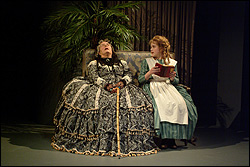If you’re even considering going to see Book-It Repertory Theatre’s adaptation of Louisa May Alcott’s ode to the fab four protofeminists Jo, Meg, Beth, and Amy, you presumably come prepared to risk the deep diabetic coma that the story’s sheer sweetness threatens to induce in viewers. As the London Telegraph noted of one of a great many stage adaptations, Little Women is “a terrifying orgy of niceness.” This remains true of Book-It’s production (through Fri., Dec. 23, at Center House Theatre; 206-216-0833, www.book-it.org) despite the best efforts of adaptor Joy Marzec and director Allison Narver (the Empty Space Theater honcho), who, aghast at the sentimentality of the recent touring Broadway musical version, strove to bring out the dark side of the diminutive distaff quartet.
Oh, you get a glimpse of aspiring writer Jo (Rhonda J. Soikowski) stomping out of her study in a snit when her writing isn’t going well and selfishly wishing spinsterhood on her big sister, Meg (Alexandra Tavares), so she won’t ever have to see her move away from their penny-pinched little Massachusetts paradise in the midst of the Civil War. And artsy kid sis Amy (Caitlin Kinnunen) acts spoiled and haughty, even when busted for torching Jo’s precious manuscript. Meg, who’s sort of a saintly lieutenant-mother in the absence of their absolutely terrifyingly saintly mom, Marmee (Lori Larsen), has no apparent flaws beyond referring to the rowdy kids she has to baby-sit as “cross midgets.” (After Little Women and the sequel, Good Wives, Alcott should’ve written Cross Midgets, wherein the March girls discover corporal punishment.) Pianist Beth (Hana Lass) does have a flaw: She’s so good she tends to die young.
But the reduced-calorie story remains sweeter than Frangos. The flavoring is artificial: Even by the grossly sentimental standards of 1868, Little Women was cynically commercial “trash,” as Alcott put it—”moral pap for the young.” What made it work was the keen attention to domestic detail, the politics of sisterhood, the pressures of no money, and a rare fictional universe in which men were supporting players and women ran the show.
Narver’s production, smooth, thoughtful, and glossy, gets much of this right. It makes do on a budget in a way the thrifty March clan would approve. Jennifer Zeyl’s scenic design cleverly packs plenty onto a snug stage: the March living room; the upstairs bedroom where the kids’ Pickwick Club meets and Jo writes; the manse of kindly old plutocrat Laurence (Eddie Levi Lee) and his affable Nerf ball of a son, Laurie (Colin Byrne); the frozen stream the kids perilously skate. (The stage poorly accommodates the ballroom scenes, though.) Costume designer Ron Erickson nimbly manages to make bitchy rich Aunt March (Jody McCoy in full cry) wear a hoop skirt louder than she is.
The acting is solid throughout, though the most talented actor, Larsen, is straitjacketed into a narrow role she might’ve struggled more strenuously against—maybe she didn’t want to upstage the girls. Soikowski gives Jo a winning Annie Oakley strut and Annie grin, 14-year-old Kinnunen is already a pro, and Tavares, who was certified as a pro by the UW this May, masters the fine art of making Meg’s goody two-shoes click with precision (until that dang ankle snaps). As Beth, the underwritten sister, Lass underacts to the correct extent. Allan Armstrong’s Mr. March, based on Louisa’s dad, abolitionist Bronson Alcott, is a cipher, because Alcott wrote him that way; how much more interesting if she’d seen through his self-righteous act and portrayed him as the self-absorbed, family-impoverishing guy Bronson really was.
Most plays have second-act problems. This one has first-act problems. Trimming so much of the text drains the impact of anecdotes that verged on lame to begin with, and shows the bareness of the episodic plot in a way that reminds me of a bony shaved poodle. Some scenes seem pointless; more seem punchless. You start musing about how Bronson Alcott, an education reformer, invented recess, and long for one. But the second act perks up so well, you’re glad you stuck around. Book-It makes Alcott’s characters register, but this particular story was still happier as a book.








